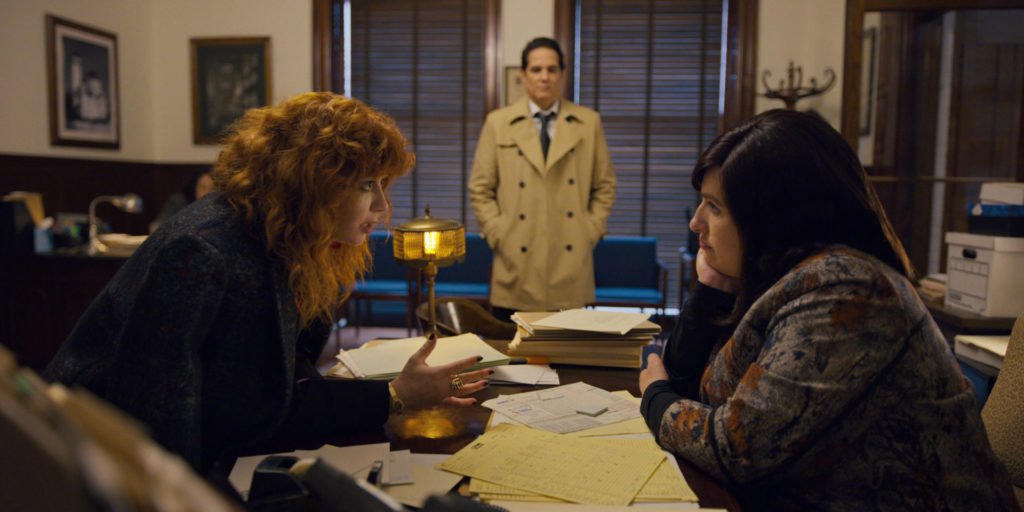Ask your average Jew whether he or she believes in reincarnation and that person will probably shrug. But Jewish reincarnation is a real thing. The Kabbalistic concept of gilgul, meaning “cycle,” refers to souls transmigrating throughout different lives over centuries, like a revolving door.
Moses, for example, is said to be the gilgul of Abel. More recently, Rabbi Yitzchak Ginsburgh has said that he believes Isaac Newton was reincarnated from Noah (he of the ark fame).
It sounds a little silly, but who knows? There’s a nugget of righteousness behind it. God put us on Earth, some say, to complete all 613 mitzvot and each time our souls are reborn, we’re tasked with another opportunity to cross the finish line. Life is a constant struggle; humans are imperfect; the cycle continues.
Looking at life through that lens, the plot of Russian Doll makes a lot more sense.
The critically acclaimed TV show, which debuted on Netflix earlier this year, kicks off with a snappy Groundhog Day-style plot: on the night of her 36th birthday, a reckless New Yorker named Nadia abruptly dies and finds herself brought back to life – reincarnated, if you will – and utterly confused. What just happened? Was it the cigarette laced with cocaine? Was it a ghost haunting her friend’s gentrified yeshivah-turned-loft? Nadia snaps a photo of the Hebrew inscription above the front door and asks the friend what it says. “Don’t you know?” another hungover friend replies. “You’re Jewish-y.”
Nadia is indeed Jewish-y – as is the actress, Natasha Lyonne, who was born Natasha Bianca Lyonne Braunstein to an Orthodox family descended from Holocaust survivors. Lyonne started acting during a year the family spent in Israel. After they returned to New York and her parents divorced, she got expelled from a private Jewish school for selling weed.
Lyonne’s personal backstory really clicks when you watch Russian Doll, which Lyonne co-created with Amy Poehler and writer Leslye Headland, and for which she will surely be nominated for (if not win) a Golden Globe. The plot is broadly supernatural enough that any Kabbalistic grounding is tenuous at best, but the thoughts are all there, as evident as Lyonne’s hallmark husky voice.
Yet while the show is sufficiently Jewish to earn a column in this newspaper, any religious subtext flies out the window midway through the series. The show fleshes out its own psychological world, where trauma, guilt, religion and fate blend into one of the most stunningly original works of television of 2019.
(If you haven’t yet watched the show and would like to, I recommend pausing here and binging all eight episodes tonight and finishing this article tomorrow, because minor spoilers lie ahead.)
While nobody in the show talks about gilgulim, the theme of missed opportunities – redeeming oneself through multiple acts of kindness during a slow, repetitive road to becoming a better person – is foundational to the story. It’s no spoiler to say that Nadia takes time figuring out what’s going on. The joy of the mystery is in peeling away each layer. She enacts small kindnesses along the way, like rescuing a homeless man’s shoes or apologizing to her ex.
Major mitzvot they’re not, but we watch her incremental progress with each reincarnation. She meets the man who rolled the cigarette, cozies up to an Orthodox secretary and arranges a meeting with a rabbi to learn about the building’s past.

“Mysticism teaches that there is wisdom inaccessible to the intellect,” the rabbi says. “You can only reach it through surrender. Being nothing. Turn away from the physical world and toward the spiritual one.” And the building? He waves away the suggestion. “Buildings aren’t haunted – people are,” he says.
Every clue is both a red herring and a piece of the puzzle. Nadia’s Jewish background sort of means nothing, but the unknowable cosmic forces directing our lives push her forward behind every scene. Is it God? Reincarnation? Do multiple timelines exist simultaneously? Who knows. Bottom line: ask questions and be a good person. Nothing sounds more Jewish than that.
